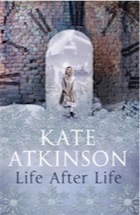“After the first death, there is no other,” Dylan Thomas wrote. How obvious, one might think. But the one-time-only nature of death is anything but self-evident in Kate Atkinson’s new novel, “Life After Life.”
Schlagwort-Archive: Kate Atkinson
Interview: Kate Atkinson
Unlike most successful novelists who can thrive no matter what reviewers say, Kate Atkinson admits to reading what they write about her. And why not? The notices for her most recent novel, “Life After Life”, have been nothing but good.
Rezension: Kate Atkinson: “Life After Life”
In Kate Atkinson’s “Life After Life”, Ursula Todd is born in the British countryside in 1910 — and dies almost immediately, umbilical cord wrapped around her neck, “a helpless little heart beating wildly. Stopped suddenly like a bird dropped from the sky.”
Rezension: Kate Atkinson: “Life After Life”
Kate Atkinson’s new novel tells the story — excuse me, stories — of Ursula, a strange, sturdy and very brave young girl born into an English family in 1910. Ursula dies in the second chapter, at the moment of her birth, and then is reborn, again and again and again.
Rezension: Kate Atkinson: “Life After Life”
The author gets to tell one story after another in conjuring up a woman who lives and dies repeatedly, and it’s a remarkable conceit. There’s a bit of Edward Gorey-esque glee in the way she keeps knocking off her main character, but also poetry and emotion.
Rezension: Kate Atkinson: “Life After Life”
In Kate Atkinson’s literally fantastic new novel “Life After Life”, Ursula Todd, born on a snowy night in 1910, is given not the gift of life, but of many lives. But are all these parallel lives a blessing or a curse?
Rezension: Kate Atkinson: “Life after Life”
The first of Kate Atkinson’s books to feature her private investigator Jackson Brodie, “Case Histories” (2004), concerns three separate murders taking place in three different years, subtly braided together by a plot that Brodie must unravel.
Rezension: Kate Atkinson: “Life After Life”
Kate Atkinson’s new novel, “Life After Life,”is not quite a time-travel narrative, but it does dangle before its reader’s nose that most tantalizing of impossible offers, “a chance to do it again and again,” as one character puts it, “until we finally did get it right.”
Rezension: Kate Atkinson: “Life after Life”
In the midst of a love affair, Ursula Todd discovers that she is an excellent liar. The same can be said admiringly of Atkinson. “Life After Life” is a big book that defies logic, chronology and even history in ways that underscore its author’s fully untethered imagination.

Portrait: Kate Atkinson
Kate Atkinson writes critically admired family sagas that are not really family sagas; crime novels that are not really crime novels; and now, in “Life After Life” a science-fiction novel, in the loosest possible sense, that is nothing of the sort.

Rezension: Kate Atkinson: “Life After Life”
This novel is constantly acute and real and touching about familial and (especially) sibling love. Impressively – and unusually – some of her most engaging and best-realised characters are the good, kind, decent ones.
Rezension: Kate Atkinson: “Life After Life”
Themes of fate, family life and renewal are brilliantly explored in this story of a life lived in wartime Britain. Kate Atkinson’s new novel, “Life after Life” is a marvel, a great big confidence trick – but one that invites the reader to take part in the deception.
Service: Autorin Kate Atkinson erhält Radio-Bremen-Krimipreis 2012
Der Radio-Bremen-Krimipreis geht in diesem Jahr an die britische Autorin Kate Atkinson. Die Jury zeichnete Atkinson für ihre, so die Begründung, doppelbödige Erzähltechnik und für die gelungenen Psychogramme innerfamiliärer Beziehungsdramen aus.
Rezensionen: Aprilausgabe von literaturkritik.de
Besprochen werden diesmal: “Eismord” von Giles Blunt, “Das vergessene Kind” von Kate Atkinson, “Tote Augen” von Karin Slaughter, “Das Tamtam der Angst” von Roman Scolombe, “Spur der toten Mädchen” von Michael Connelly und noch einige mehr.
Februarausgabe der Krimi-Couch
Dieses Mal mit: dem Volltreffer »Der Anschlag« von Stephen King, dem Krimi-Blitz 2011, Rezensionen zu »Das vergessene Kind« von Kate Atkinson, »Headhunter« von Jo Nesbø, »Das Alphabethaus« von Jussi Adler-Olsen und vielen anderen.
Deutscher Krimi Preis 2012
Preisträger: National: 1. Mechtild Borrmann: »Wer das Schweigen bricht«, 2. Friedrich Ani: »Süden«, 3. Elisabeth Herrmann: »Zeugin der Toten«. International: 1. Peter Temple: »Wahrheit«, 2. Don Winslow: »Zeit des Zorns«, 3. Kate Atkinson: »Das vergessene Kind«.
Service: Das Beste aus 2011
Antje Deistler stellt die besten Bücher des Jahres 2011 vor, darunter: »Das vergessene Kind« von Kate Atkinson, »Kahlschlag« von Joe R. Lansdale sowie »Splitter im Auge« von Norbert Horst.
Rezension: Kate Atkinson: »Das vergessene Kind«
Mit ihrem jüngsten Buch scheint Kate Atkinson endgültig in der Krimiwelt angekommen zu sein. Privatdetektiv Jackson Brodie, einst eher Nebenfigur, ist zum ordentlichen Ermittler aufgestiegen. Und es geht um einen echten Kriminalfall.
Rezension: Kate Atkinson: »Das vergessene Kind«
Atkinsons Roman gehört schon noch in die große Schublade »Kriminalroman«, darin aber wegen seiner tollen Charakterstudien und der 1a-Schreibe in die mit rotem Samt ausgeschlagene Ecke für die besonders guten Exemplare dieser Gattung.
Rezensionen: Intrigen, Bandenkriege und phantastische Morde
Es werden besprochen: Didier Daeninckx’ »Tod auf Bewährung« , Frank Göhres »Kiez-Trilogie« , Håkan Nessers »Die Einsamen«, Kate Atkinsons »Das vergessene Kind« und Heinrich Steinfests »Die Haischwimmerin«.